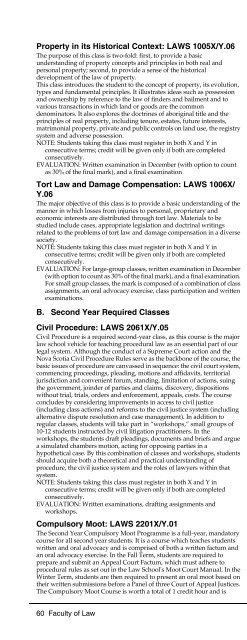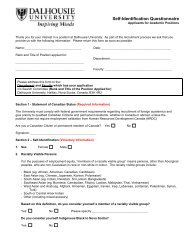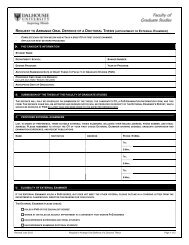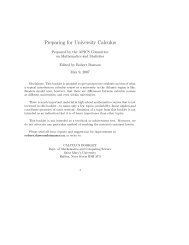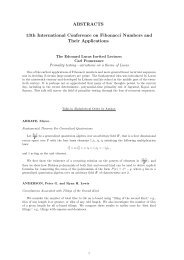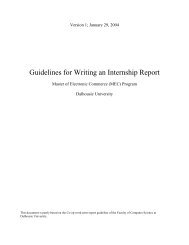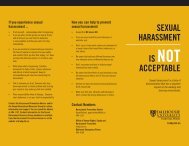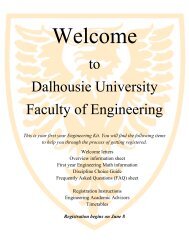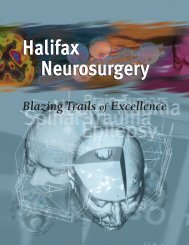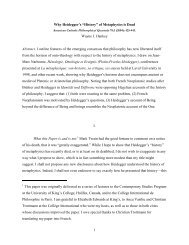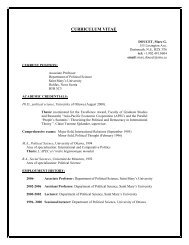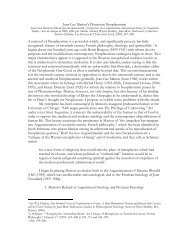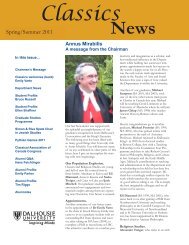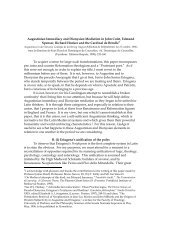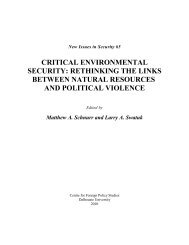Smoke Free/Scent Free Dalhousie - Dalhousie University
Smoke Free/Scent Free Dalhousie - Dalhousie University
Smoke Free/Scent Free Dalhousie - Dalhousie University
Create successful ePaper yourself
Turn your PDF publications into a flip-book with our unique Google optimized e-Paper software.
Property in its Historical Context: LAWS 1005X/Y.06<br />
The purpose of this class is two-fold: first, to provide a basic<br />
understanding of property concepts and principles in both real and<br />
personal property; second, to provide a sense of the historical<br />
development of the law of property.<br />
This class introduces the student to the concept of property, its evolution,<br />
types and fundamental principles. It illustrates ideas such as possession<br />
and ownership by reference to the law of finders and bailment and to<br />
various transactions in which land or goods are the common<br />
denominators. It also explores the doctrines of aboriginal title and the<br />
principles of real property, including tenure, estates, future interests,<br />
matrimonial property, private and public controls on land use, the registry<br />
system and adverse possession.<br />
NOTE: Students taking this class must register in both X and Y in<br />
consecutive terms; credit will be given only if both are completed<br />
consecutively.<br />
EVALUATION: Written examination in December (with option to count<br />
as 30% of the final mark), and a final examination<br />
Tort Law and Damage Compensation: LAWS 1006X/<br />
Y.06<br />
The major objective of this class is to provide a basic understanding of the<br />
manner in which losses from injuries to personal, proprietary and<br />
economic interests are distributed through tort law. Materials to be<br />
studied include cases, appropriate legislation and doctrinal writings<br />
related to the problems of tort law and damage compensation in a diverse<br />
society.<br />
NOTE: Students taking this class must register in both X and Y in<br />
consecutive terms; credit will be given only if both are completed<br />
consecutively.<br />
EVALUATION: For large-group classes, written examination in December<br />
(with option to count as 30% of the final mark), and a final examination.<br />
For small group classes, the mark is composed of a combination of class<br />
assignments, an oral advocacy exercise, class participation and written<br />
examinations.<br />
B. Second Year Required Classes<br />
Civil Procedure: LAWS 2061X/Y.05<br />
Civil Procedure is a required second-year class, as this course is the major<br />
law school vehicle for teaching procedural law as an essential part of our<br />
legal system. Although the conduct of a Supreme Court action and the<br />
Nova Scotia Civil Procedure Rules serve as the backbone of the course, the<br />
basic issues of procedure are canvassed in sequence: the civil court system,<br />
commencing proceedings, pleading, motions and affidavits, territorial<br />
jurisdiction and convenient forum, standing, limitation of actions, suing<br />
the government, joinder of parties and claims, discovery, dispositions<br />
without trial, trials, orders and enforcement, appeals, costs. The course<br />
concludes by considering improvements in access to civil justice<br />
(including class actions) and reforms to the civil justice system (including<br />
alternative dispute resolution and case management). In addition to<br />
regular classes, students will take part in “workshops,” small groups of<br />
10-12 students instructed by civil litigation practitioners. In the<br />
workshops, the students draft pleadings, documents and briefs and argue<br />
a simulated chambers motion, acting for opposing parties in a<br />
hypothetical case. By this combination of classes and workshops, students<br />
should acquire both a theoretical and practical understanding of<br />
procedure, the civil justice system and the roles of lawyers within that<br />
system.<br />
NOTE: Students taking this class must register in both X and Y in<br />
consecutive terms; credit will be given only if both are completed<br />
consecutively.<br />
EVALUATION: Written examinations, drafting assignments and<br />
workshops.<br />
Compulsory Moot: LAWS 2201X/Y.01<br />
The Second Year Compulsory Moot Programme is a full-year, mandatory<br />
course for all second year students. It is a course which teaches students<br />
written and oral advocacy and is comprised of both a written factum and<br />
an oral advocacy exercise. In the Fall Term, students are required to<br />
prepare and submit an Appeal Court Factum, which must adhere to<br />
procedural rules as set out in the Law School's Moot Court Manual. In the<br />
Winter Term, students are then required to present an oral moot based on<br />
their written submissions before a Panel of three Court of Appeal Justices.<br />
The Compulsory Moot Course is worth a total of 1 credit hour and is<br />
60 Faculty of Law<br />
evaluated on a pass/fail/honor basis. Students who perform exceptionally<br />
well during their second-year moots may be nominated for the Smith<br />
Shield Mooting Competition, which is held in October of the following<br />
academic year.<br />
Constitutional Law: LAWS 2062X/Y.05<br />
This required 2nd year class concerns itself with three main themes; the<br />
distribution of powers under the Constitution Act 1867, the Canadian<br />
Charter of Rights and <strong>Free</strong>doms, and Aboriginal rights. This will follow<br />
from the basic introduction to and foundation for the class laid during first<br />
year by the class in Public Law. The class makes an effort to integrate<br />
division of powers, Charter and Aboriginal rights discussion to highlight<br />
both points of overlap and points of departure. Throughout the class<br />
emphasis will be placed on the roles of the constitution in our<br />
governmental structure and of the courts as its elaborator and guardian,<br />
and on constitutional litigation as a problem-solving process through<br />
which fundamental values are examined.<br />
NOTE: This course may be offered as both a full year course and as a oneterm<br />
course.<br />
EVALUATION: Written final exam with an opportunity for students to<br />
earn partial marks through other components during the term<br />
C. Third Year Required Class<br />
The Legal Profession and Professional<br />
Responsibility: LAWS 2099.02<br />
This required 3rd year class examines various aspects of the nature and<br />
organization of the legal profession in Canada, including its history and<br />
evolution, the legal and ethical responsibilities of lawyers and the<br />
influences of the adversary system on the pursuit of justice. In particular,<br />
the class covers specific ethical rules which affect all lawyers in their<br />
practices and also the wider public protection issues which face the<br />
organized legal profession. The class will be conducted by lectures and<br />
discussions involving the whole class (1 hour per week) and by small<br />
group discussions (1 hour per week). These will include special<br />
presentations, simulations and problem-solving projects. Serious attention<br />
will be given to dilemmas facing lawyers and the legal profession today.<br />
EVALUATION: Based partially on the results of a final examination and<br />
partially on small group attendance<br />
D. Second and Third Year Optional Classes<br />
Aboriginal Peoples: LAWS 2120.03<br />
This class will examine the legal position of Aboriginal peoples within<br />
Canada. The objective of the class is to sensitize students to the unique<br />
legal and policy issues which must be understood and addressed to<br />
effectively represent or otherwise work with Aboriginal peoples. Thus,<br />
course materials will engage jurisprudence and legislation within the<br />
broader nexus of Colonial history, aboriginal conditions and culture, and<br />
government programs and policies. Particular topics may include sources<br />
of law, unique constitutional provisions, the special position of Indian<br />
reserves, the nature of aboriginal title and rights, Indian treaties, fiduciary<br />
obligations, taxation, and self-government/self determination.<br />
EVALUATION: Major paper, reaction papers, and class participation.<br />
Administrative Law: LAWS 2000.04<br />
This class is an advanced study of the public law process. It studies<br />
external controls upon the exercise of statutory authority, primarily<br />
through the vehicle of judicial review. The purpose of the class is to<br />
introduce the student to the general principles of procedural and<br />
substantive judicial review as well as to develop an understanding of the<br />
workings of the administrative process and the role of the subordinate<br />
legislation.<br />
FORMAT: 4 hours per week<br />
EVALUATION: Final written examination with the possibility of an<br />
optional midterm exam, depending on the instructor.<br />
Advanced Legal Research: LAWS 2172.03<br />
This class builds on the research and writing skills acquired in the firstyear<br />
mandatory legal research and writing class. Canadian primary and<br />
secondary sources will be explored in depth. Students will have the<br />
opportunity to acquire the research skills necessary to become proficient in<br />
using legal materials of other jurisdictions e.g. the United States, Great<br />
Britain, the European Union and to explore and become familiar with<br />
international legal materials. Students will have the opportunity to acquire


